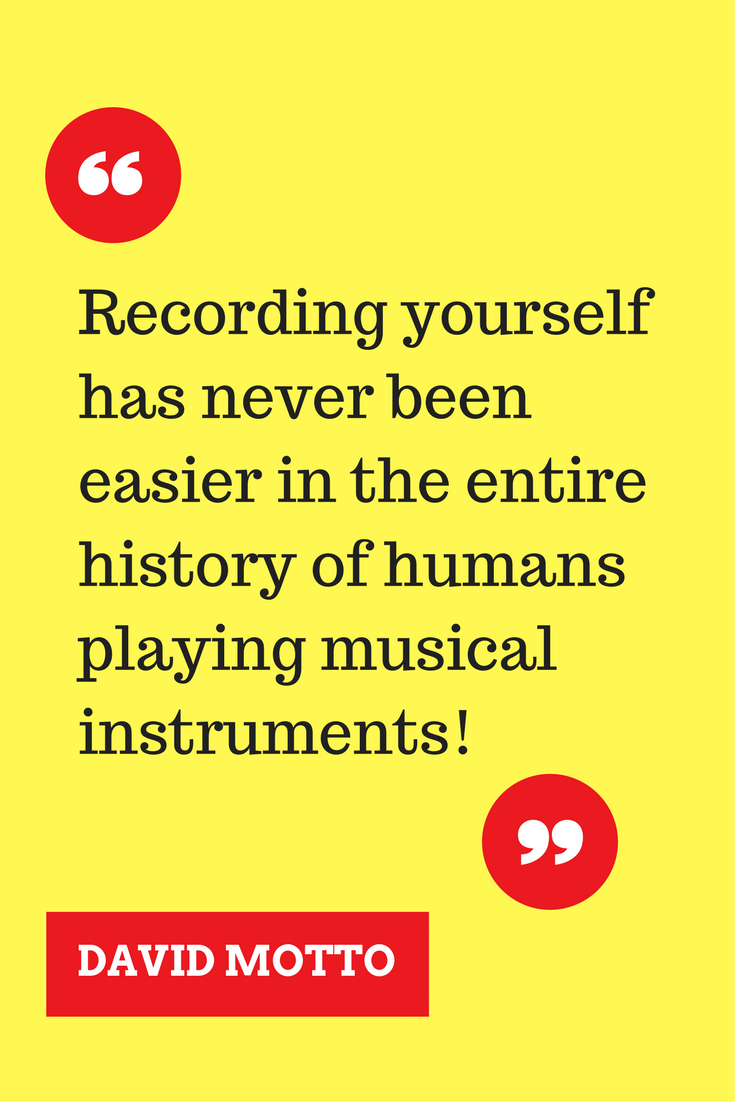David Motto’s Practice Tip of the Week:
Record Yourself
As practicing musicians we are expected to do the impossible. While playing through a section of music and concentrating on playing accurately, we are supposed to listen carefully to identify the areas that still need improvement.
Listening While Playing is Unsuccessful
Unfortunately, it is extremely difficult to play and listen to ourselves at the same time. Trying to critique your sound as you create it distracts you and lowers your ability to play your best in the first place!
Instead of evaluating yourself as you play, turn on a recorder and focus solely on your playing as you practice a section.
There will be no need to judge or criticize your performance as you create it. You can simply play, in the zone and totally focused.
The Power of Recordings
When you record yourself, a tremendous weight is lifted from your shoulders. The recording device acts as your audience, teacher, evaluator, and critic. You are simply the performer.
After you finish playing, you can listen back to the recording. It is at that time that you can form an objective opinion of the sound you produced.
As you listen to the recording, you’ll hear the actual sound you played, and your assessment of the performance will be more objective and accurate.
Focus on Your Sound, not Your Feelings
Make sure you focus on your actual sound – not on how you felt while you were producing that sound! You may have felt great or you may have felt a bit of a struggle. Forget those feelings for the time being. Just listen as if someone else produced the sound and accurately evaluate it.
How you felt while you were playing always affects your perception of your sound during the runthrough itself. Your feelings affect your already subjective sense of how you’re doing while playing. Don’t trust your feelings!
Video Recording
Audio recording is extremely useful for evaluating your sound. If you want to take recording to the next level, shoot video. It will add a whole other dimension to your self-evaluation.
With video you’ll still hear your playing AND you’ll see if you look comfortable, composed, and in control. This is a great way to get a feeling for what audiences see when they watch you perform.
The most important part of shooting video is to give you the opportunity to clearly see your physical technique. You can watch for inefficiencies, positioning, breathing, muscle tension, and a whole host of other technical details. Without video you are likely to be completely unaware of habits you’re forming. Video opens up a higher level of self-evaluation. You’ll actually see the details that your lesson teacher has been telling you about!
Recording is Easy
Recording yourself has never been easier in the entire history of humans playing musical instruments! Think of all the easy options you have:
- Your phone (which you always have with you in the practice room and which records audio and video)
- A tablet or laptop
- A high quality digital recorder designed specifically for musicians
- A digital camera (nearly all models shoot video)
- A camcorder
Recording Makes You Free
With these recordings, you’ll finally know if your intentions are clear. You’ll hear your actual sound. You’ll see what you really look like when you play.
Then, you can judge if your look and sound are meeting your expectations – without worrying about any of this when you do a performance runthrough. This will give you a level of freedom that few musicians get to experience when they’re practicing.
To Your Musical Success!
David Motto


Hi Richard – Thank you for the comment! A couple things:
1) If you’re starting your hour with technique, put the tough stuff you want to avoid into this part of your practice time. Technique can include very short, specific techniques needed for songs. End your practice time with playthroughs and fun stuff.
2) You don’t need to record yourself every day. Just when you think you’ve got something that’s ready to play. Record a runthrough to see if your internal, subjective self (you as you’re playing) agrees with your external, objective self (you as you listen to the recording). The recording/listening should take just a couple minutes, then you get back into the fixing of what you heard. Recording is a primary source of giving yourself feedback.
Hi David,
Thanks again for all this great wisdom and practical tips! One question: I am a non-professional drummer, do daily practice for an hour every day, split it up in technique, sections of songs, time, sound etc. Do you advice to record every single excercise? And when and for how long do you look and listen back? I am afraid to be more occupied with that than actual practising. Always looking for an excuse not to go to the hard parts, like you predicted in earlier posts! 😉 Just like now, when I am typing while I should be doing those rudiments on my kit 🙂 Love to hear from you, cheers Richard